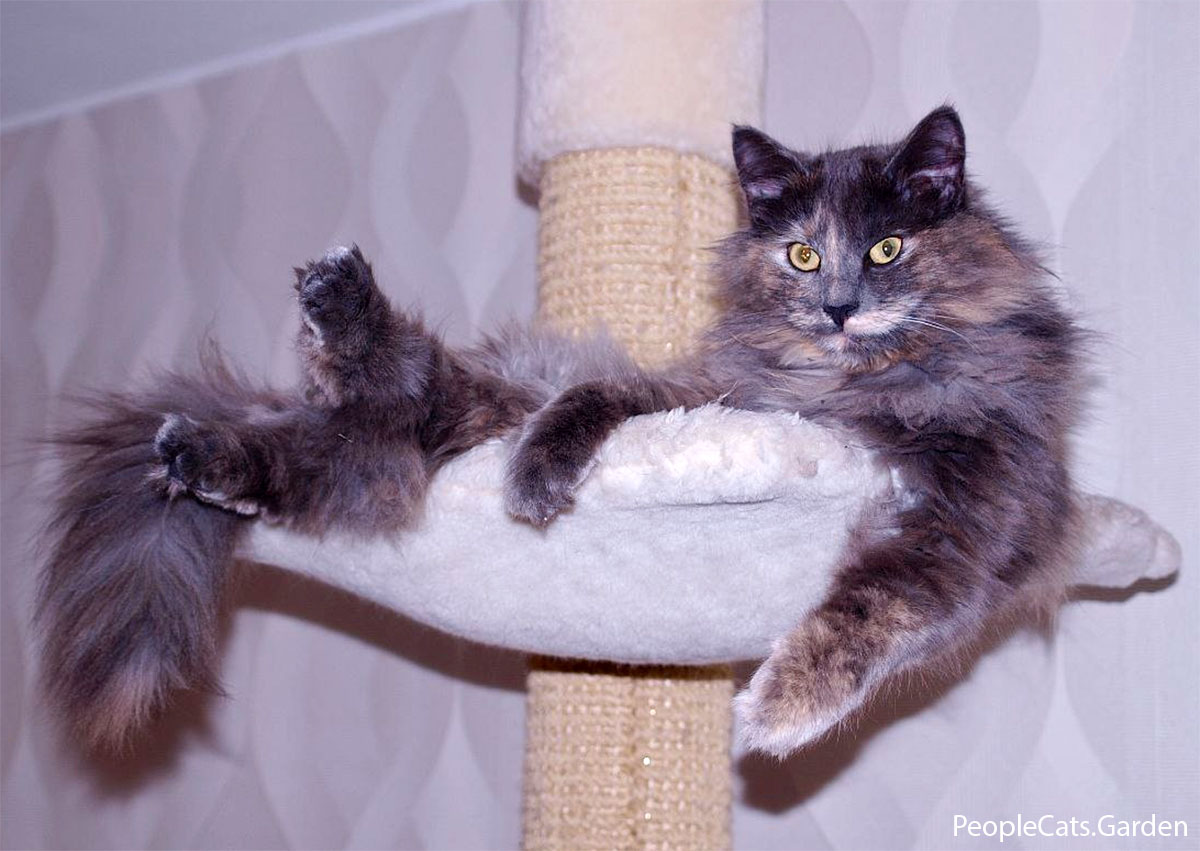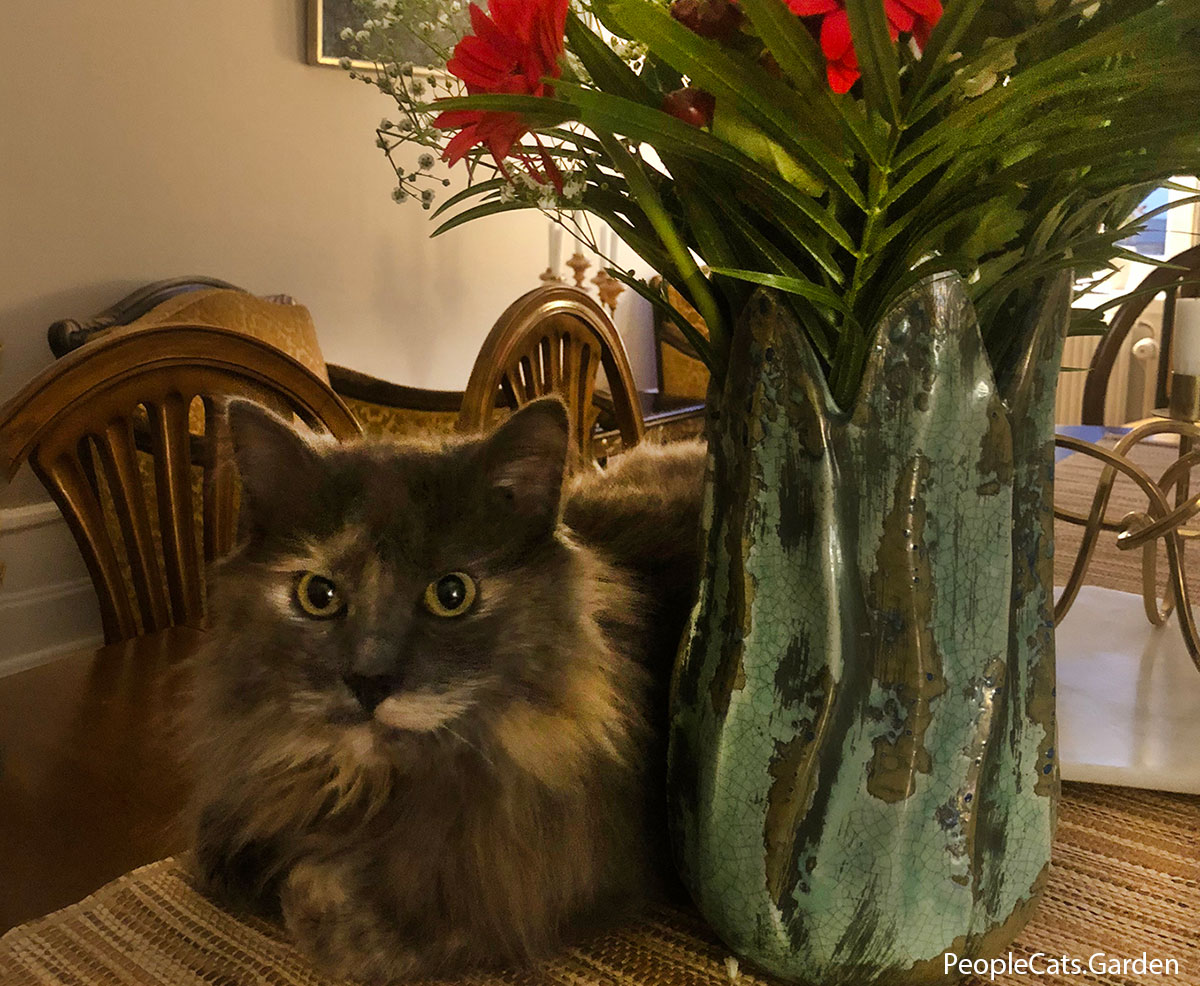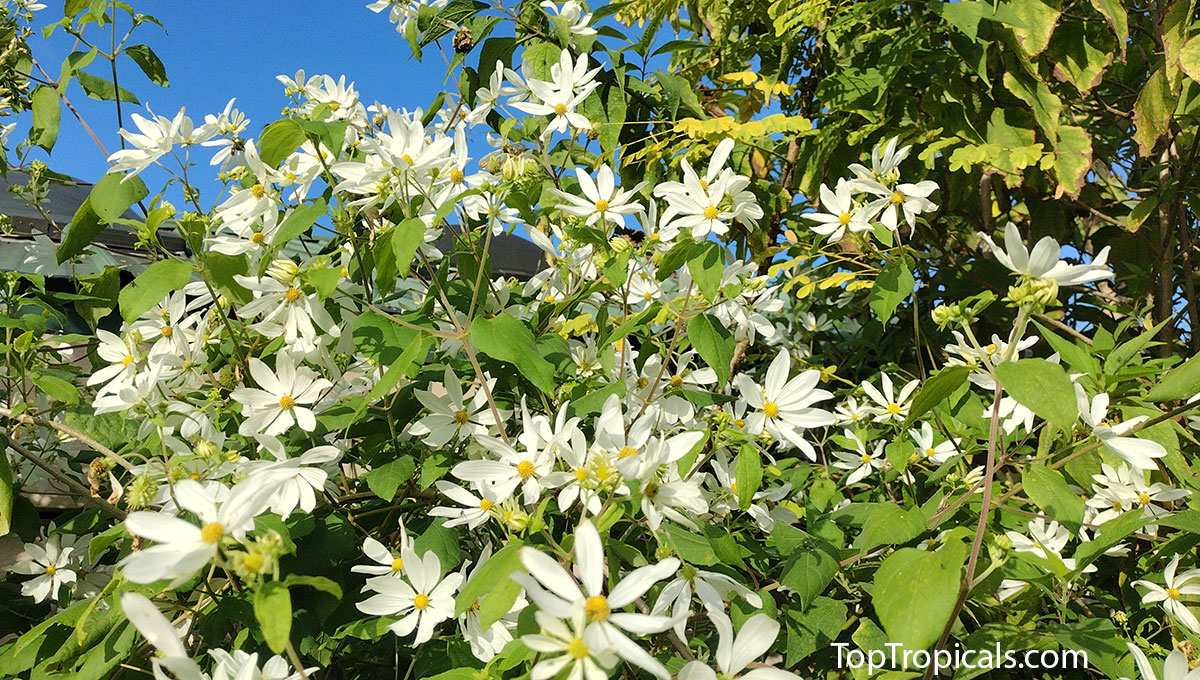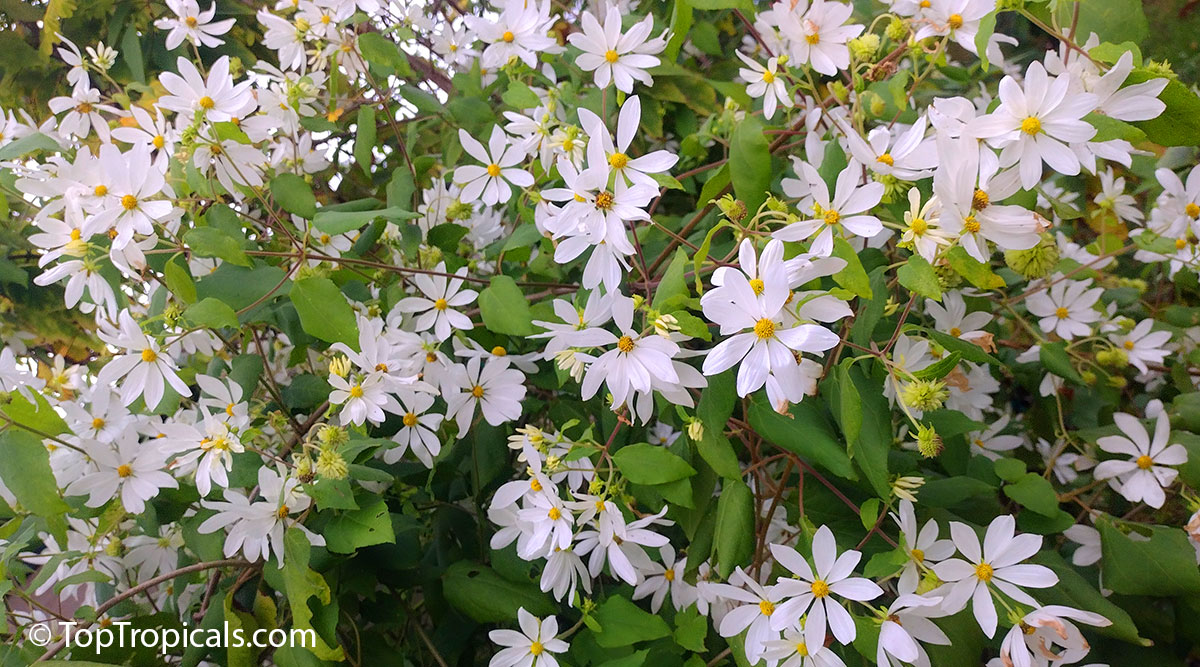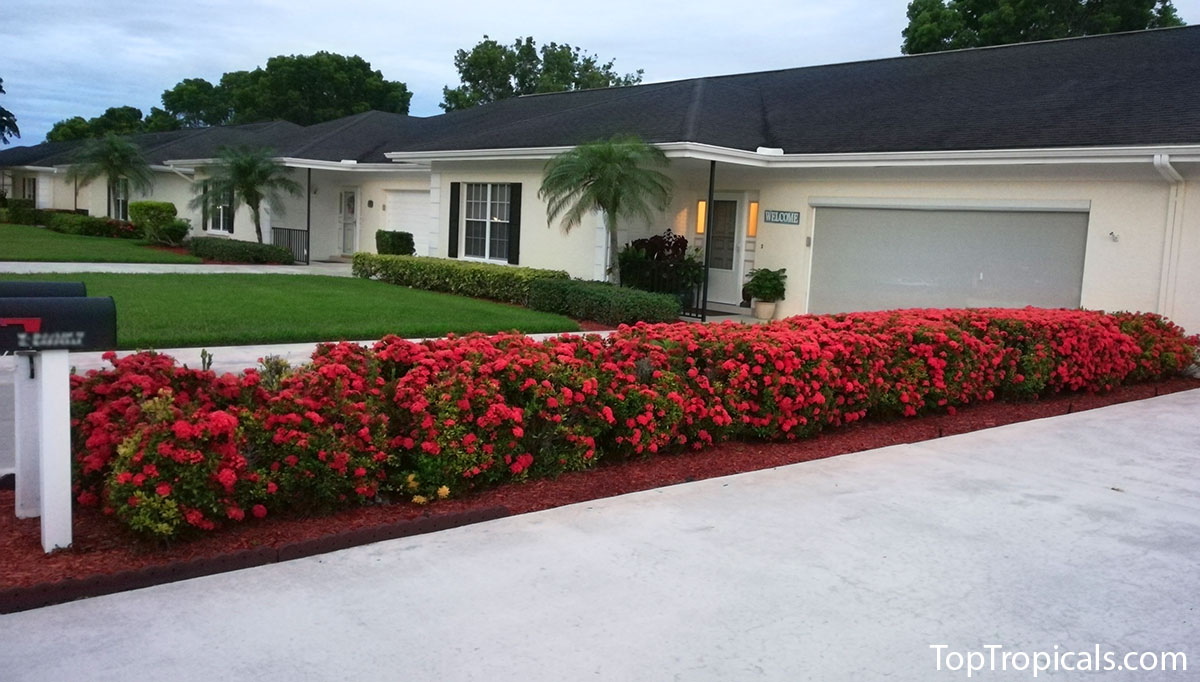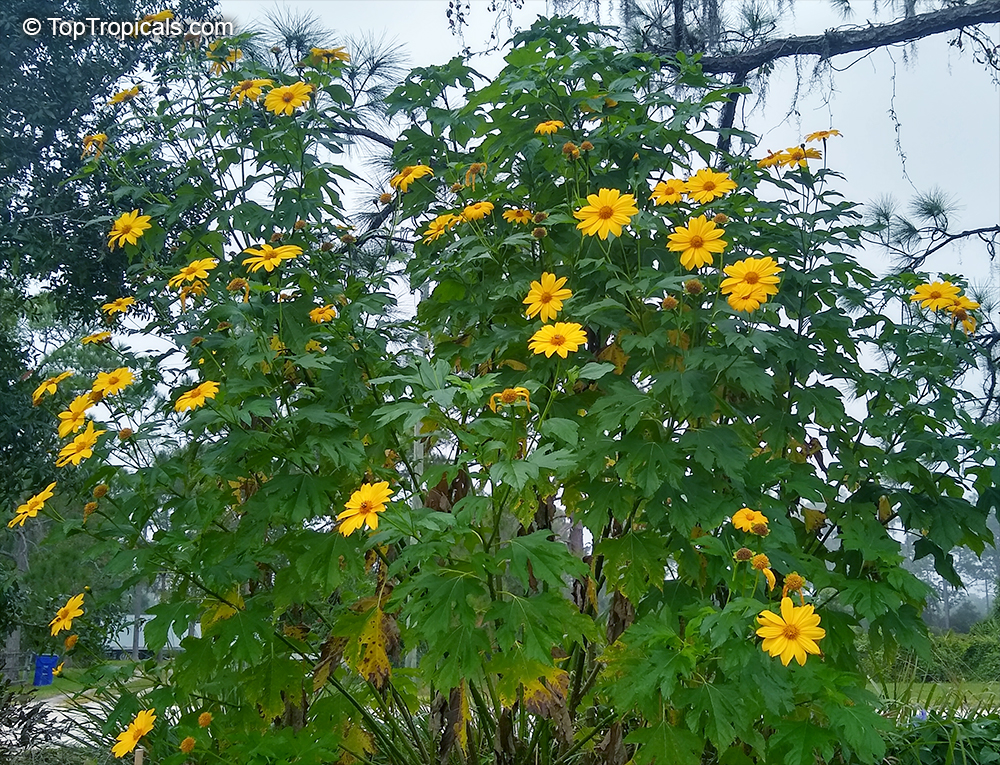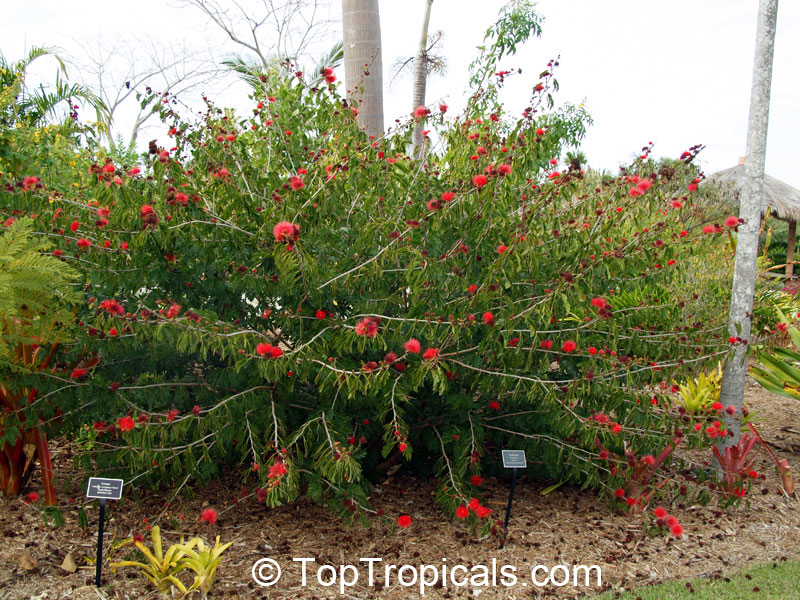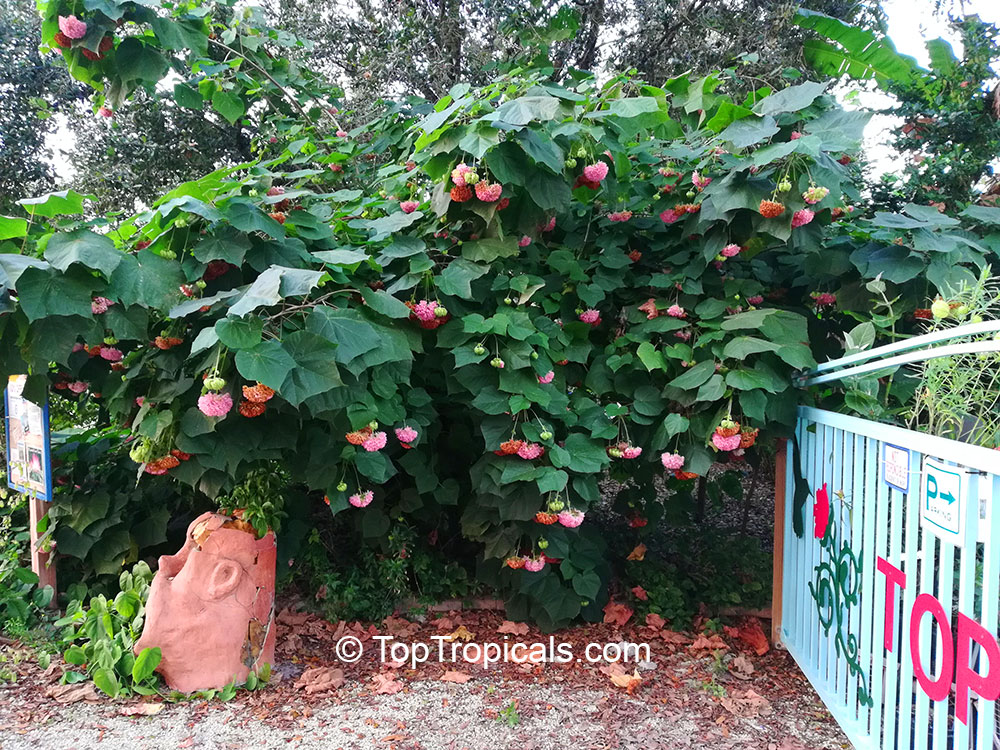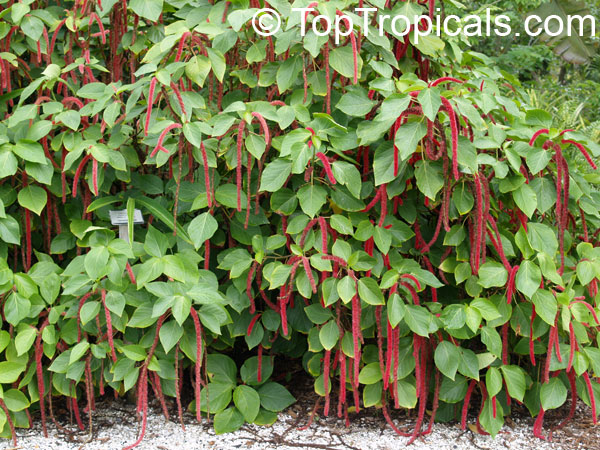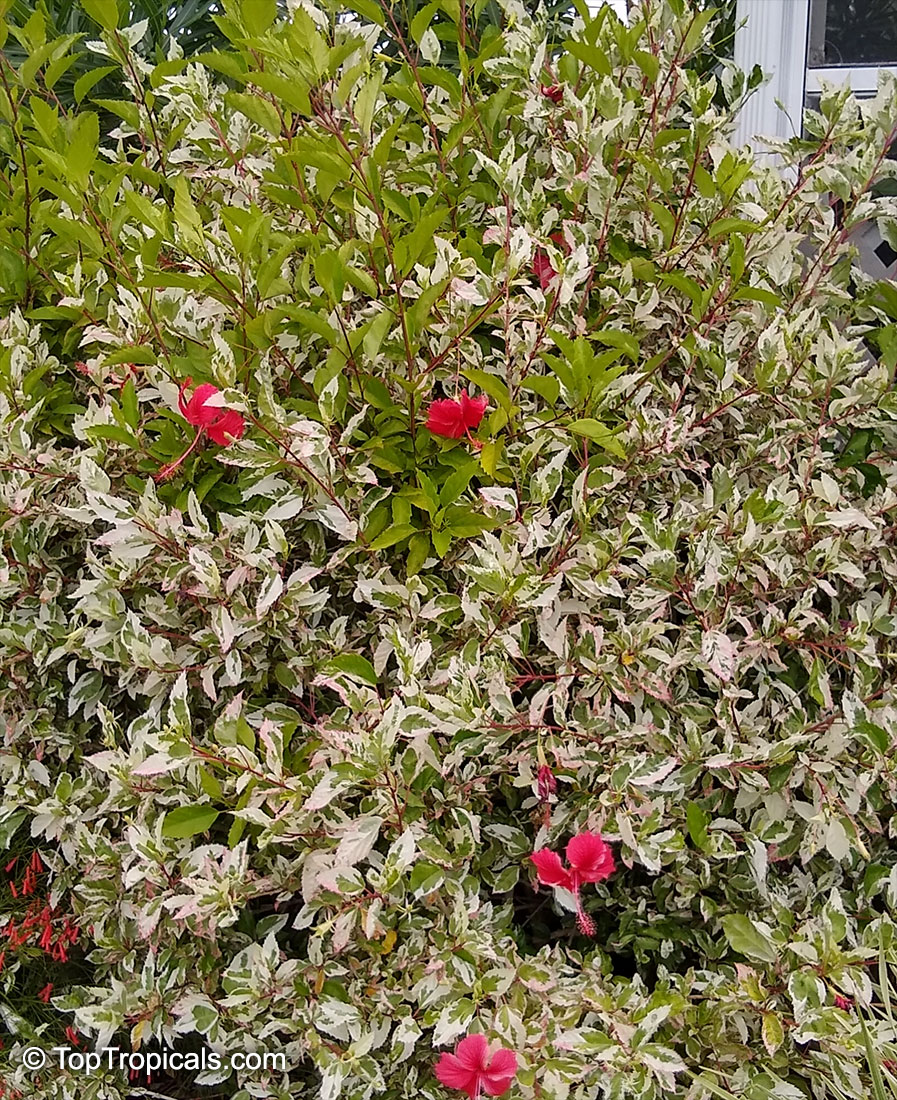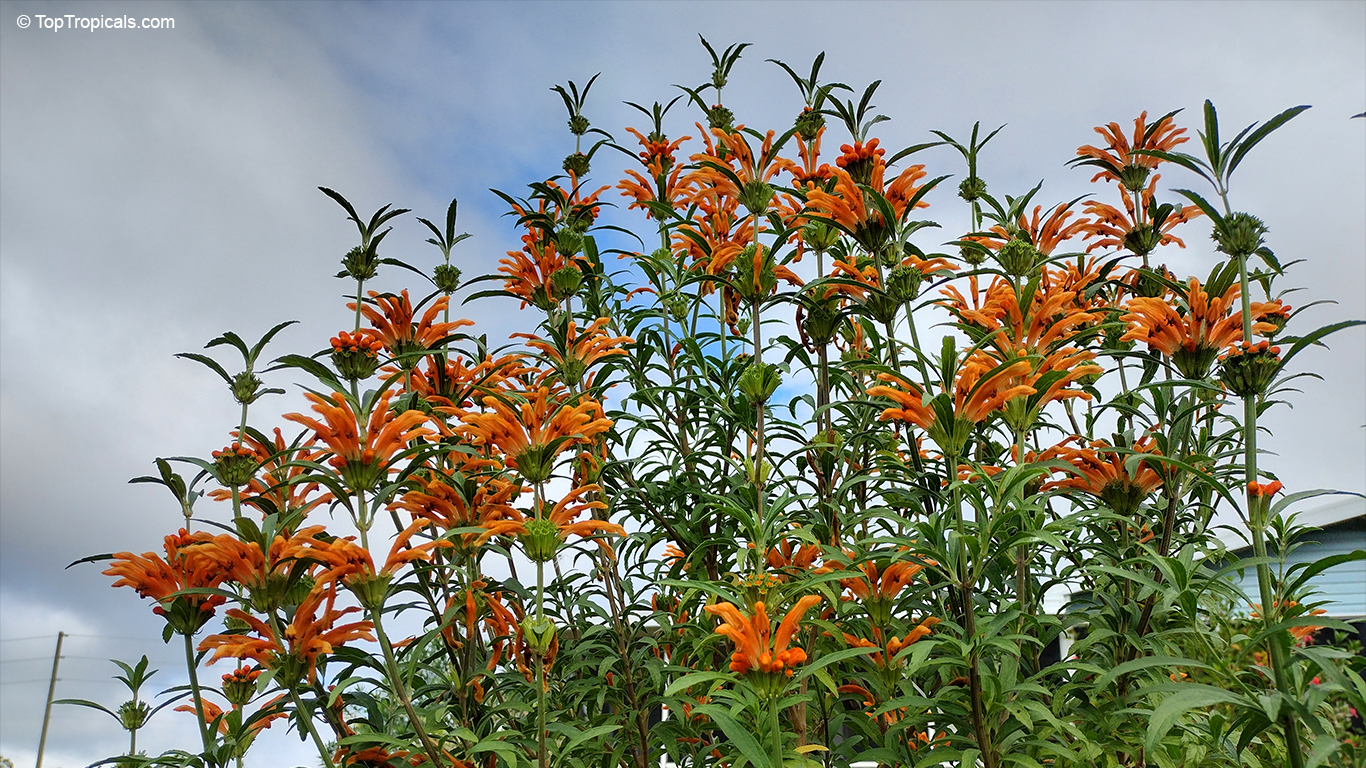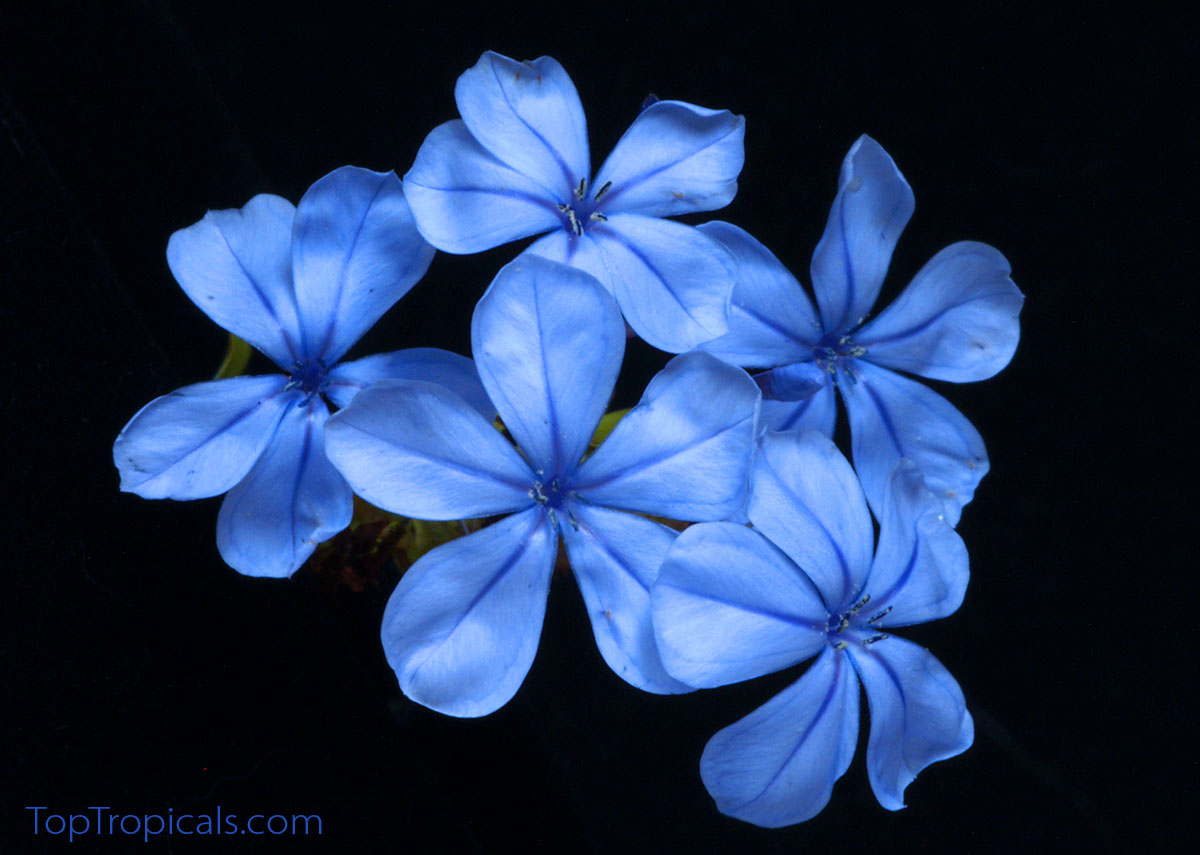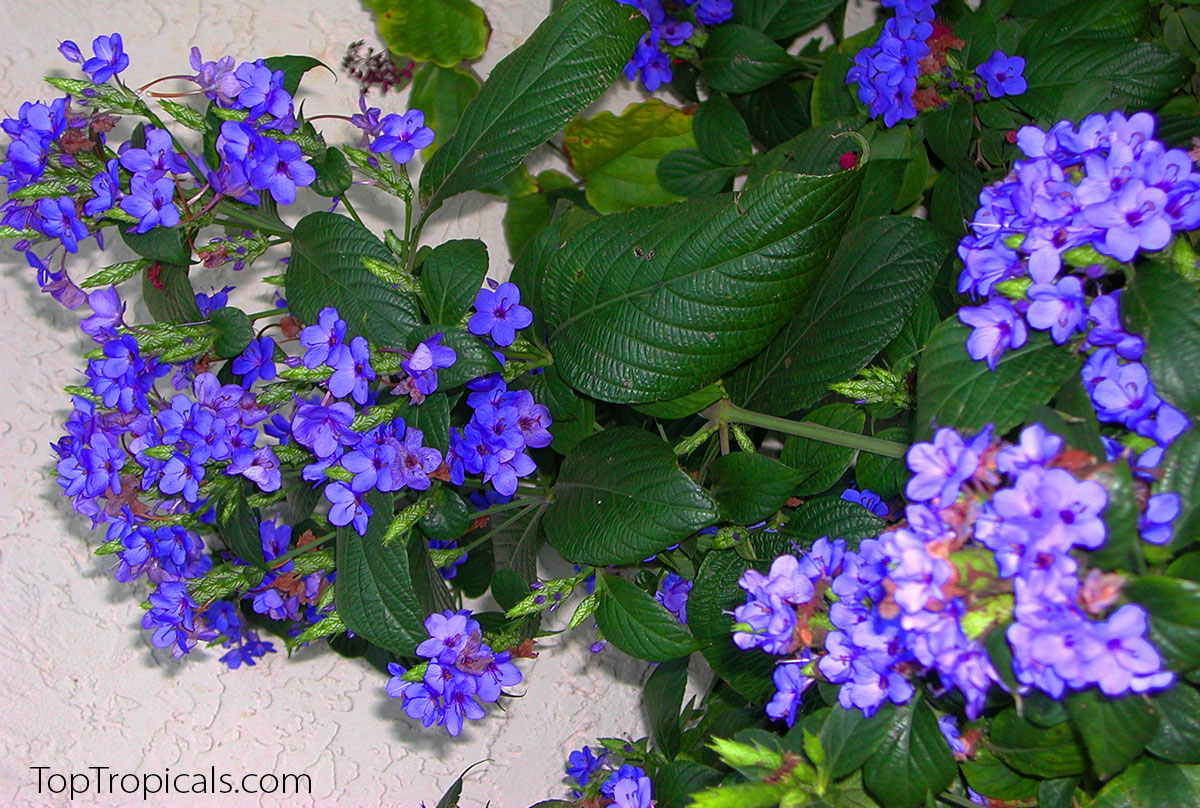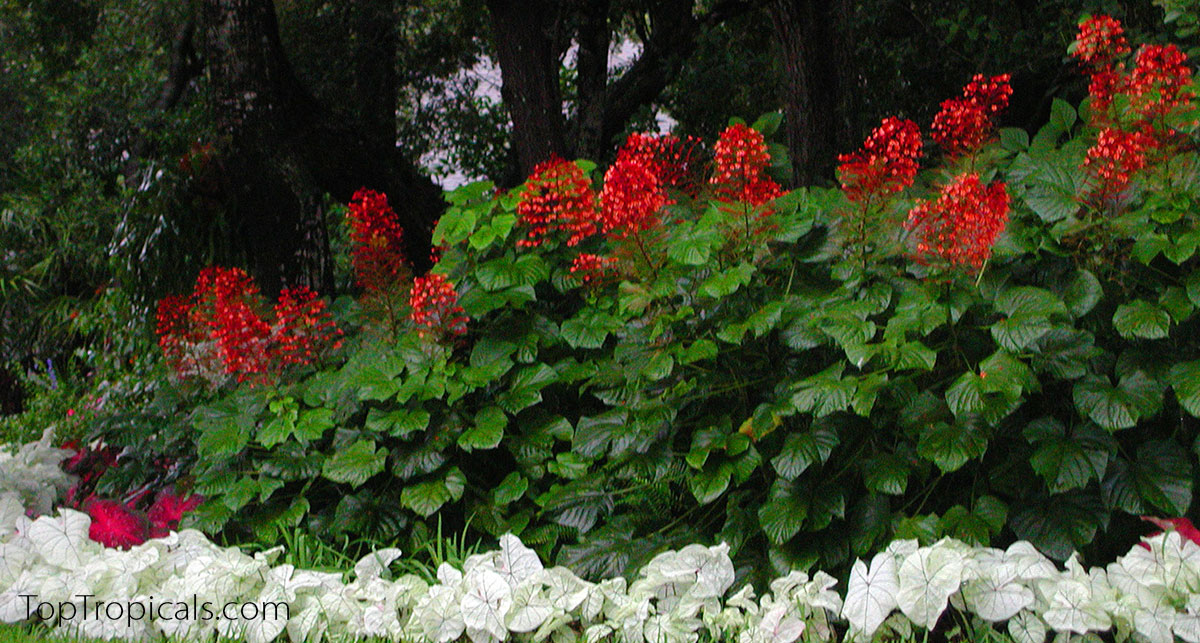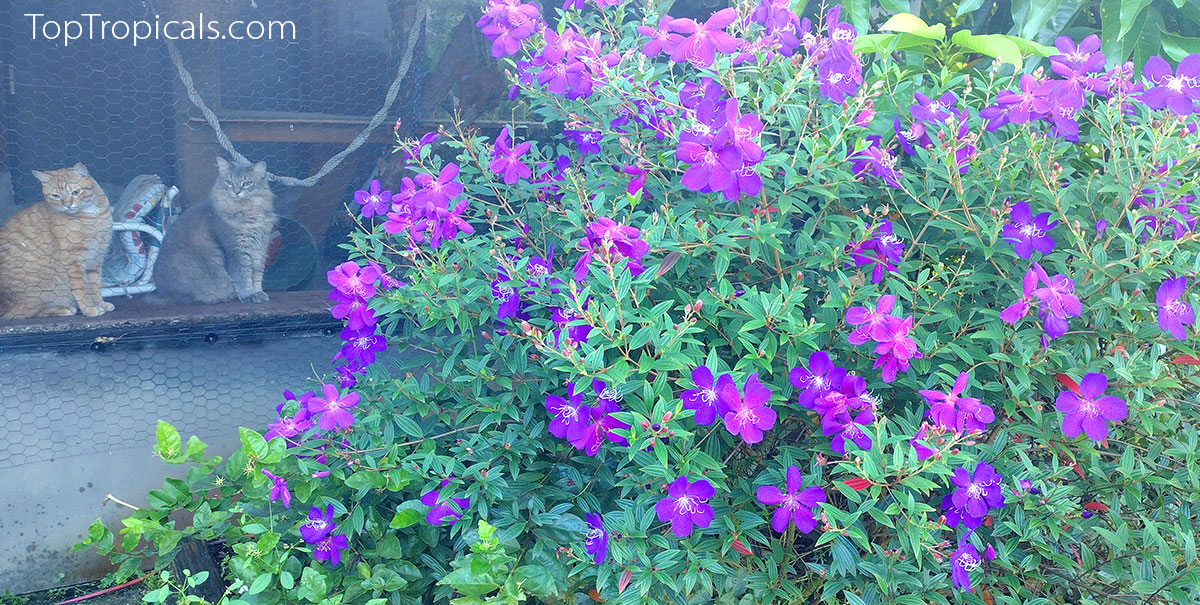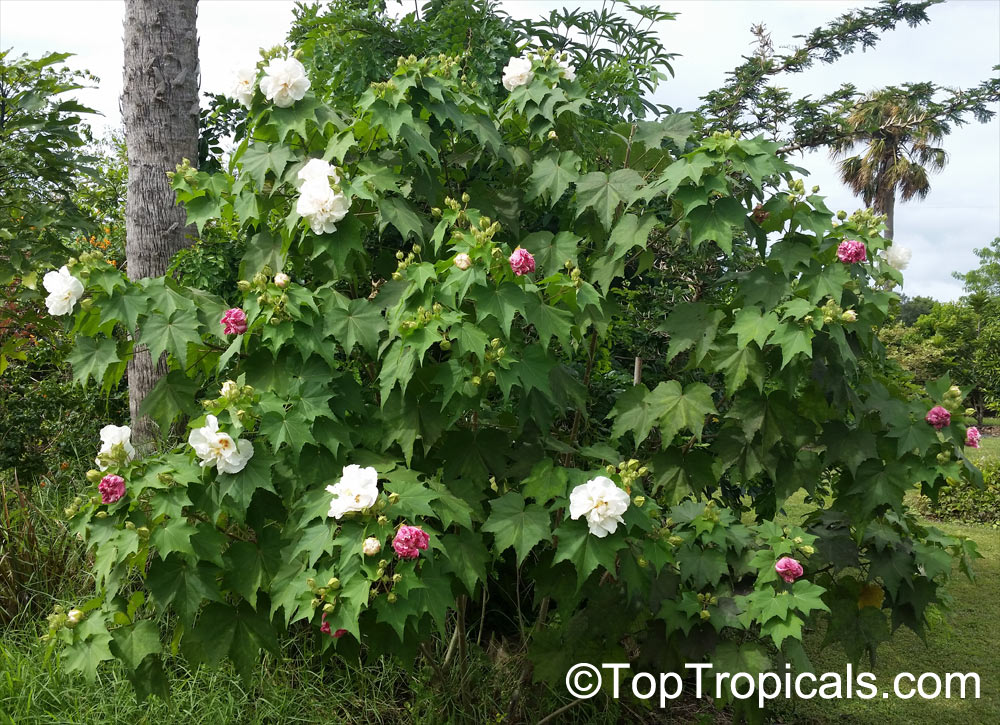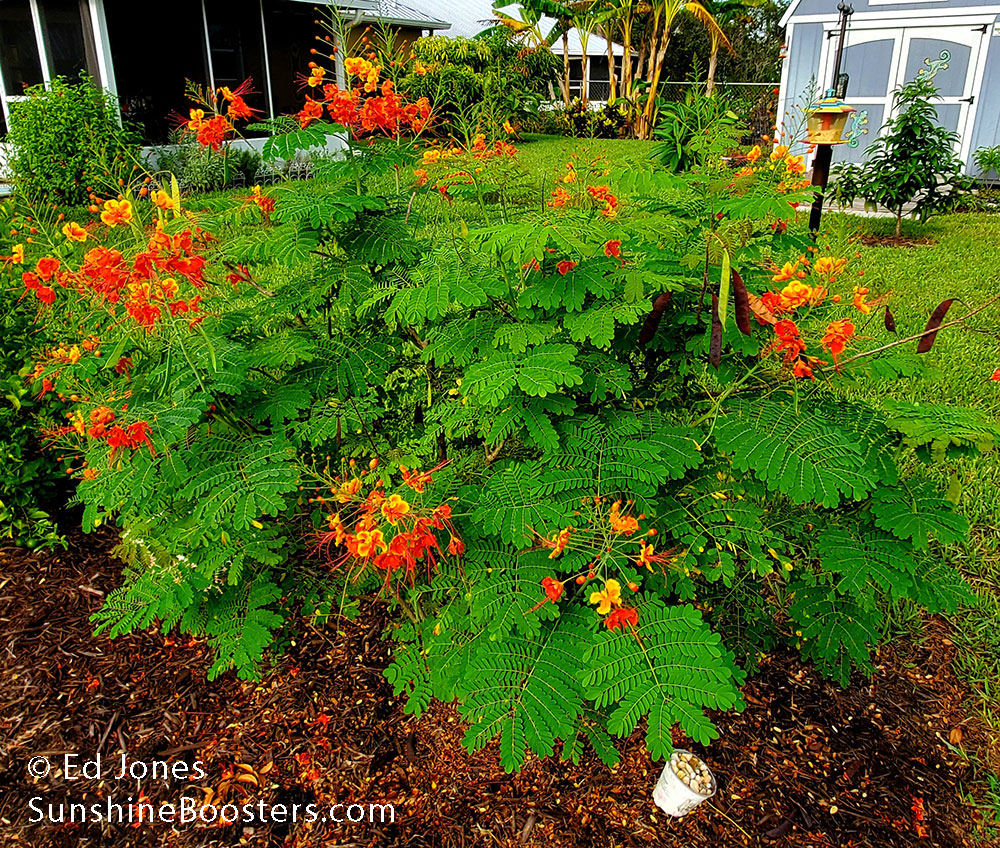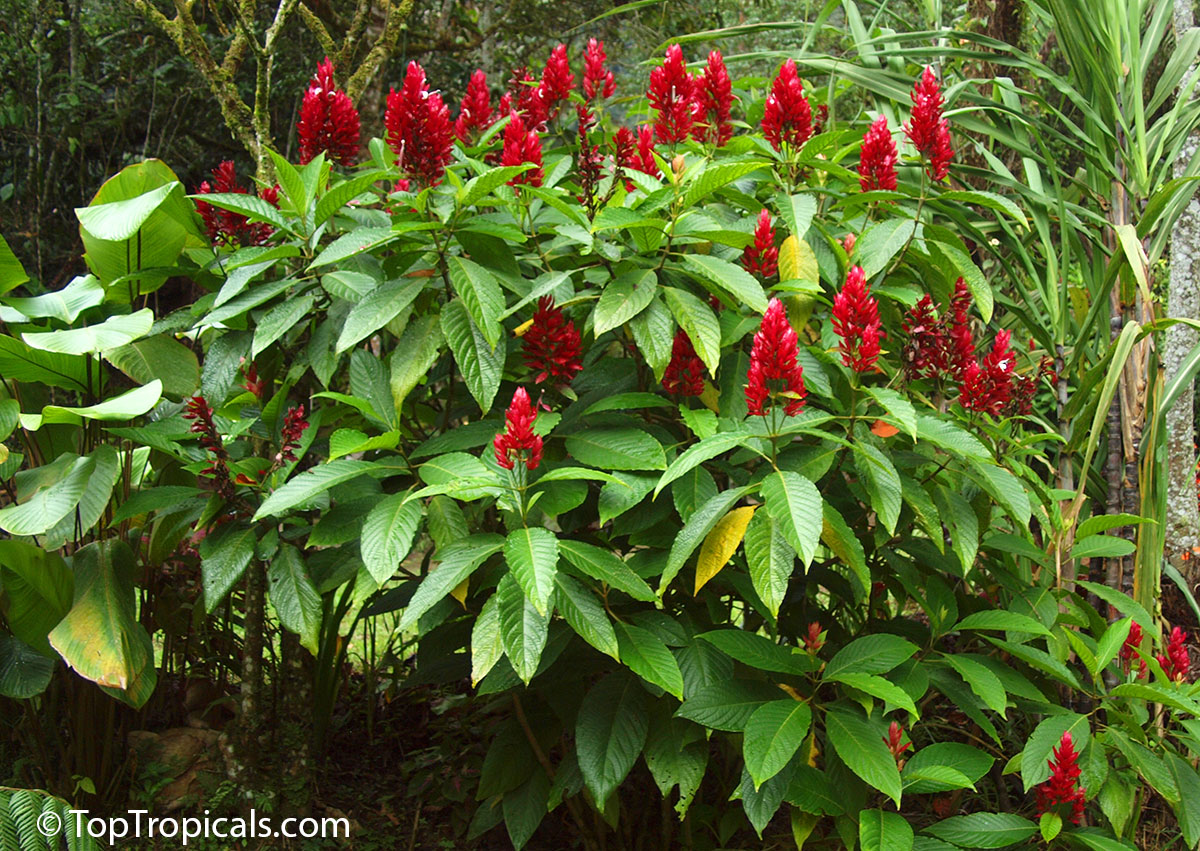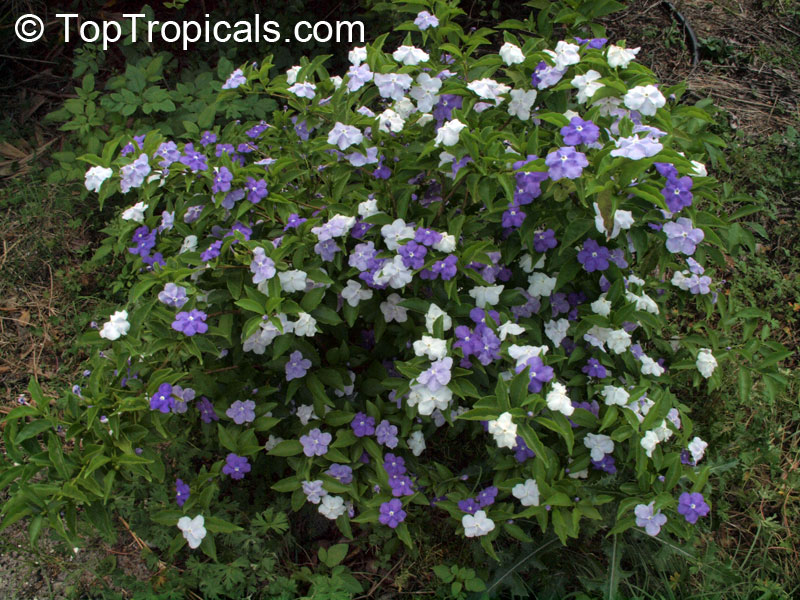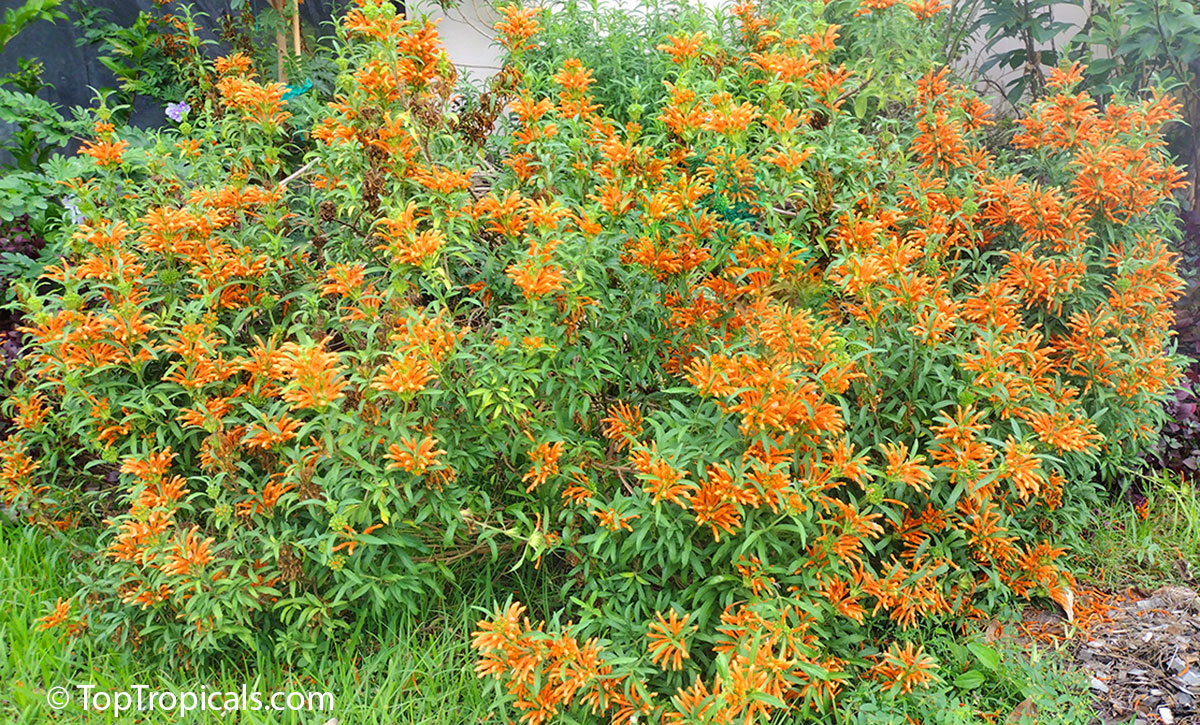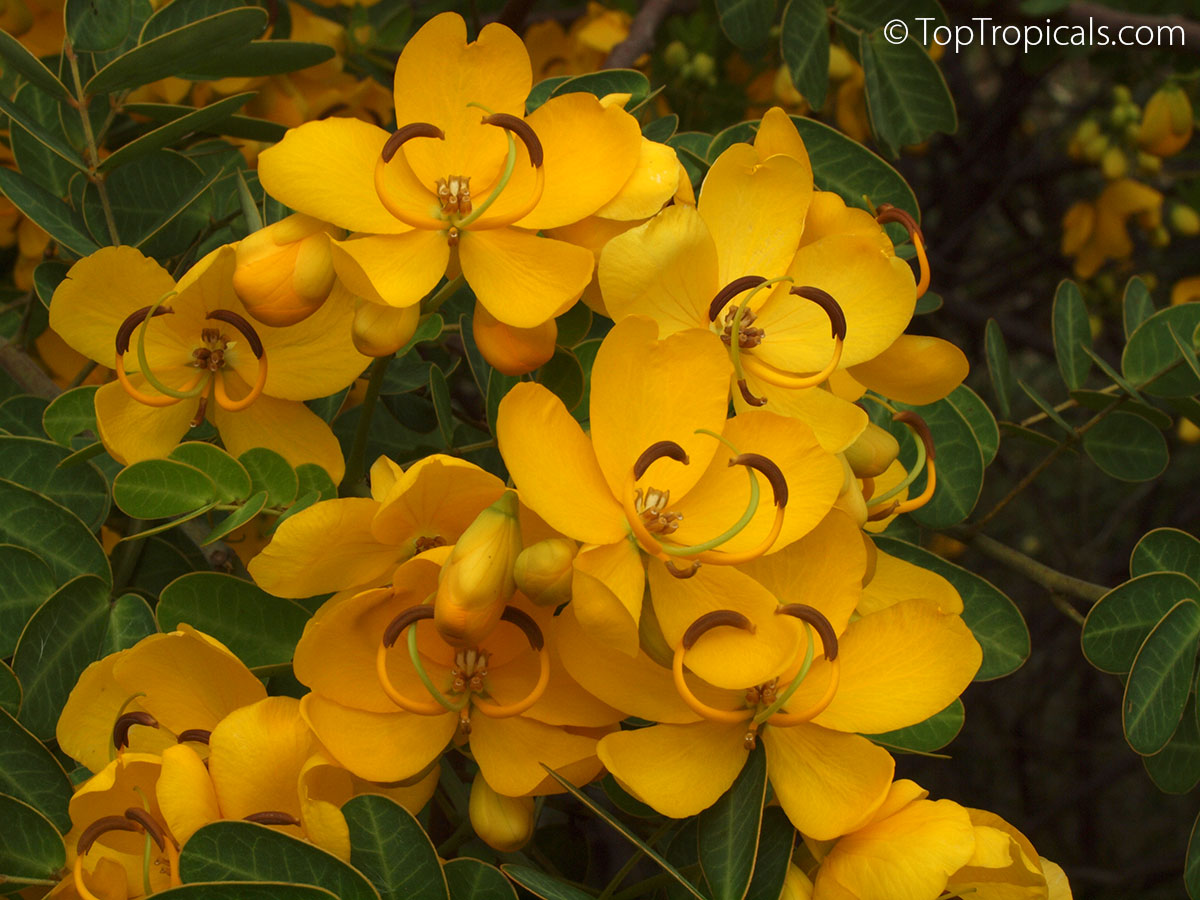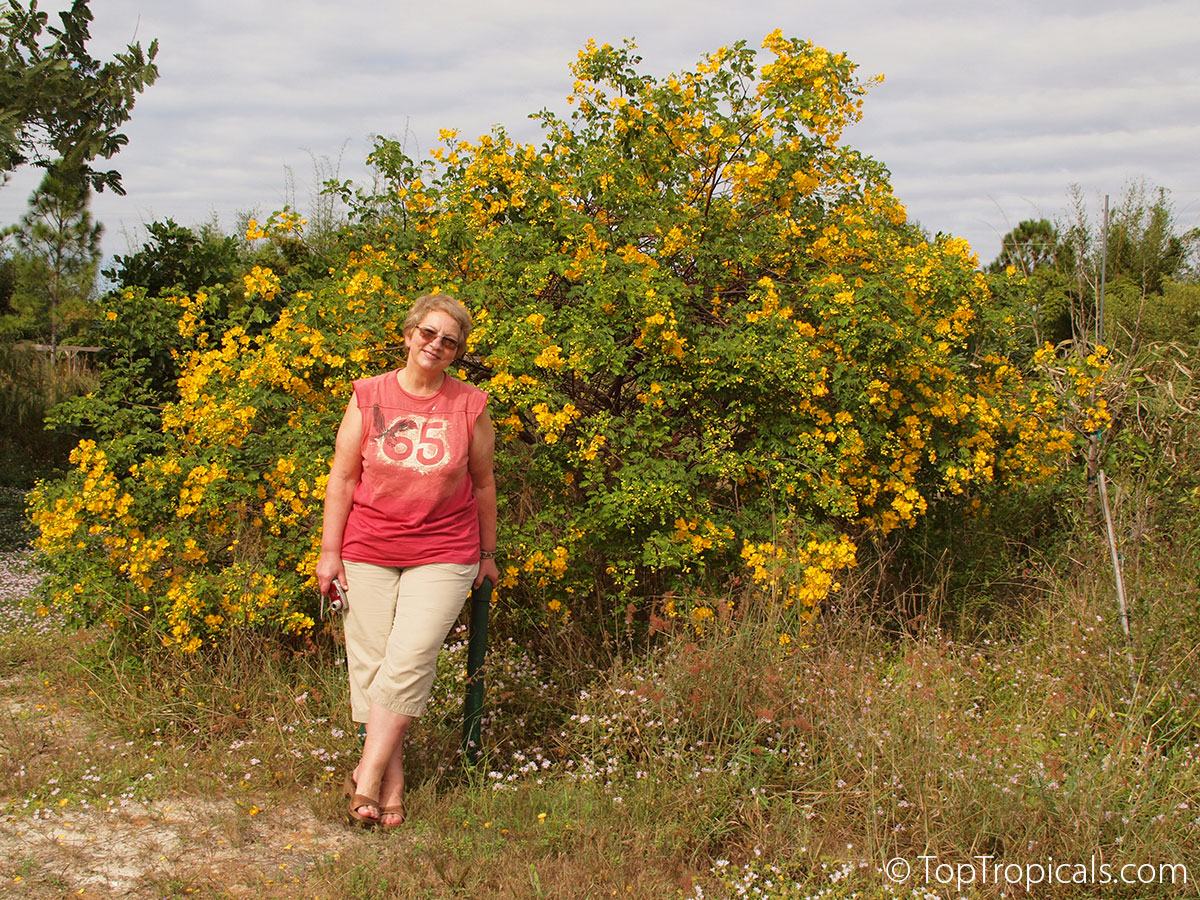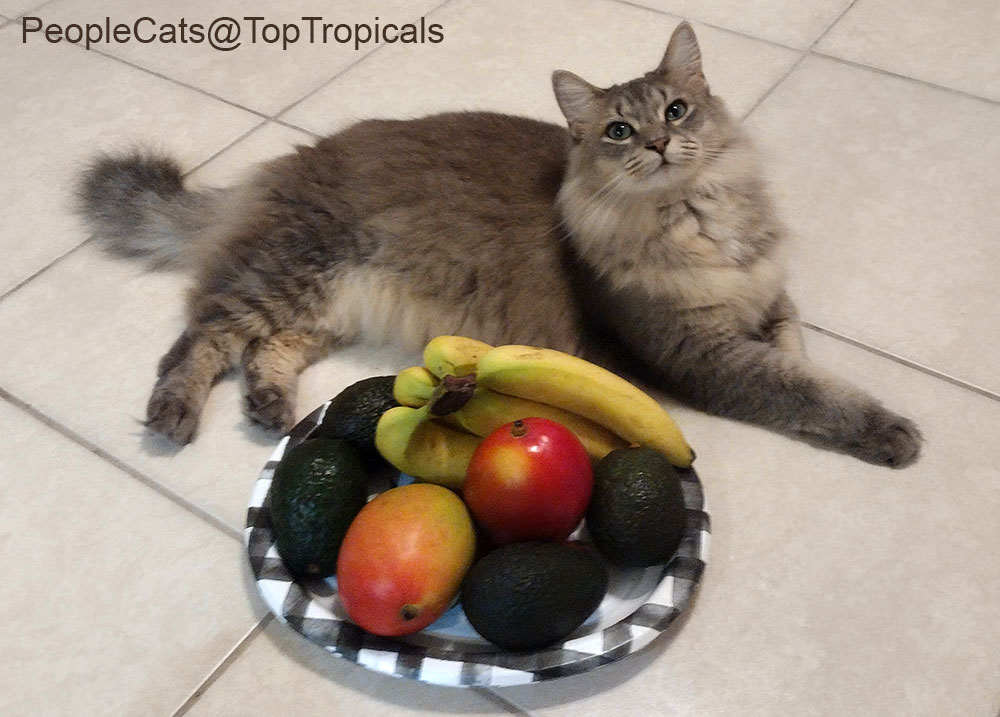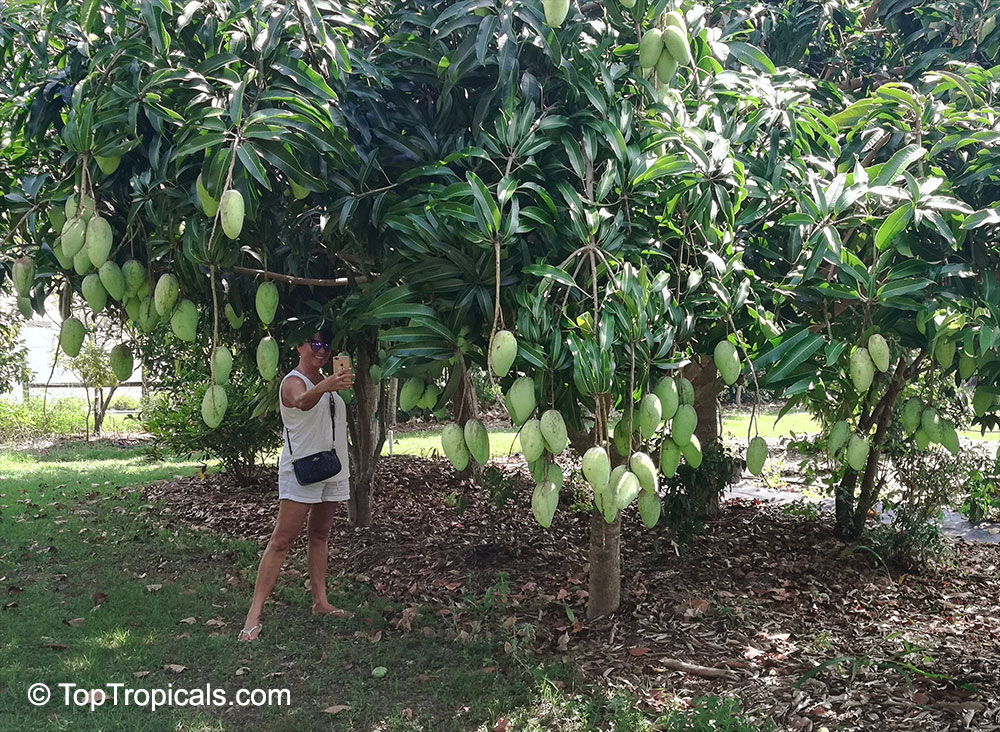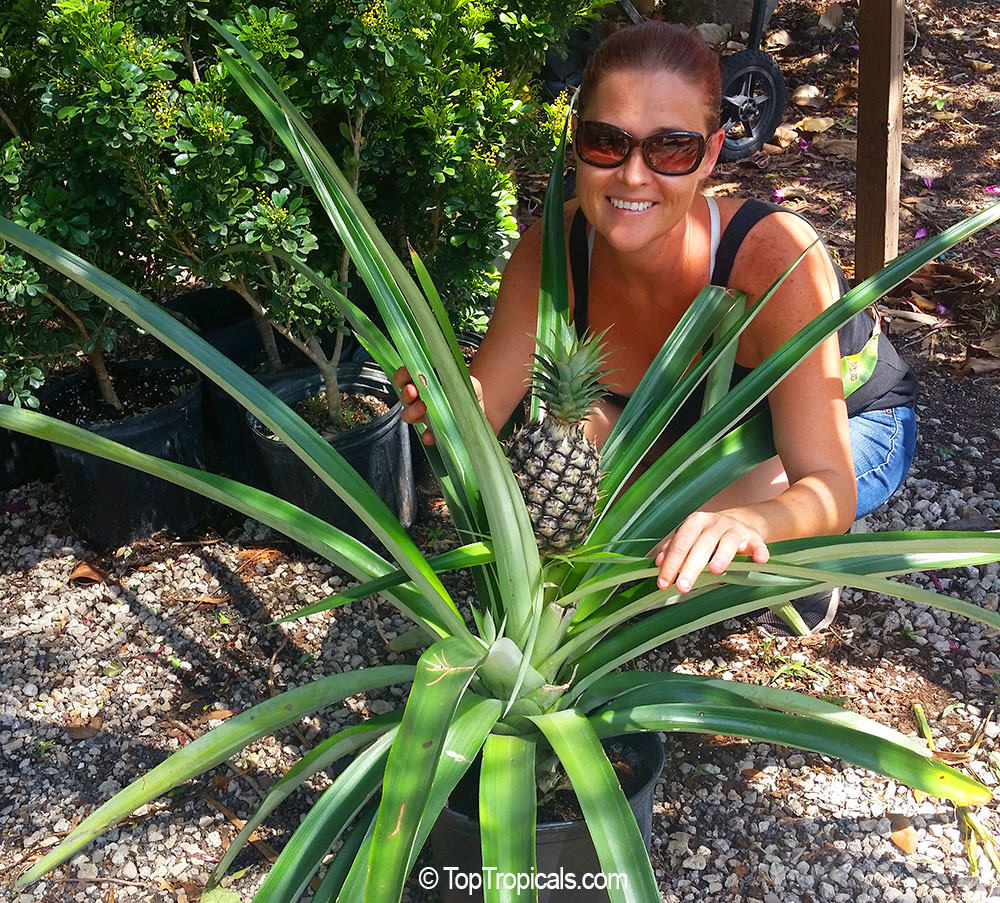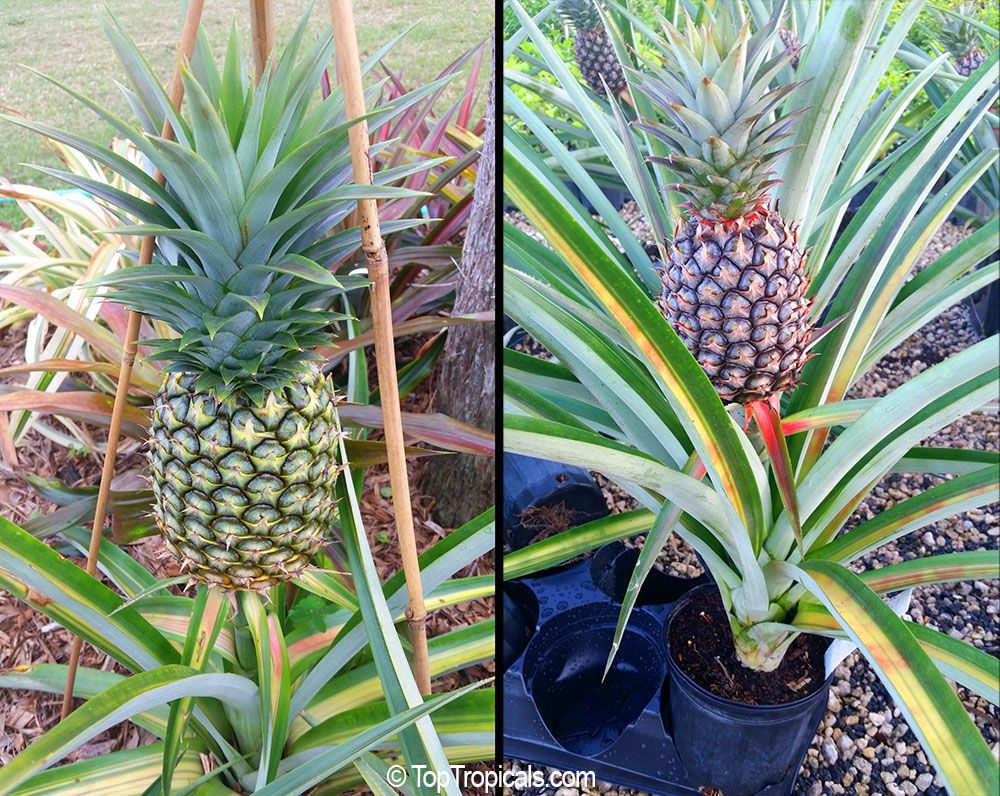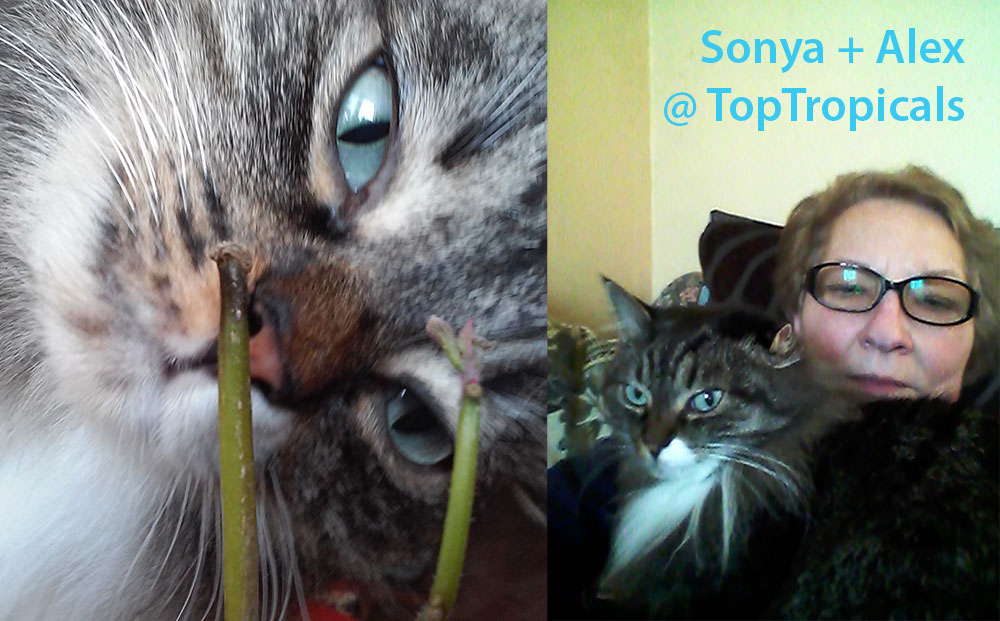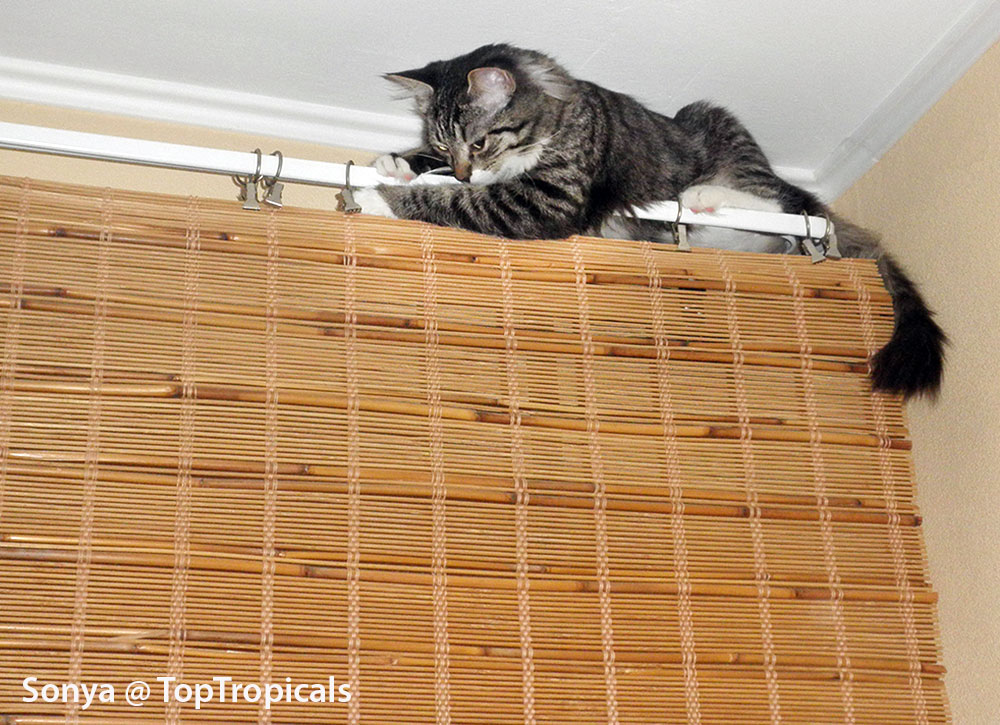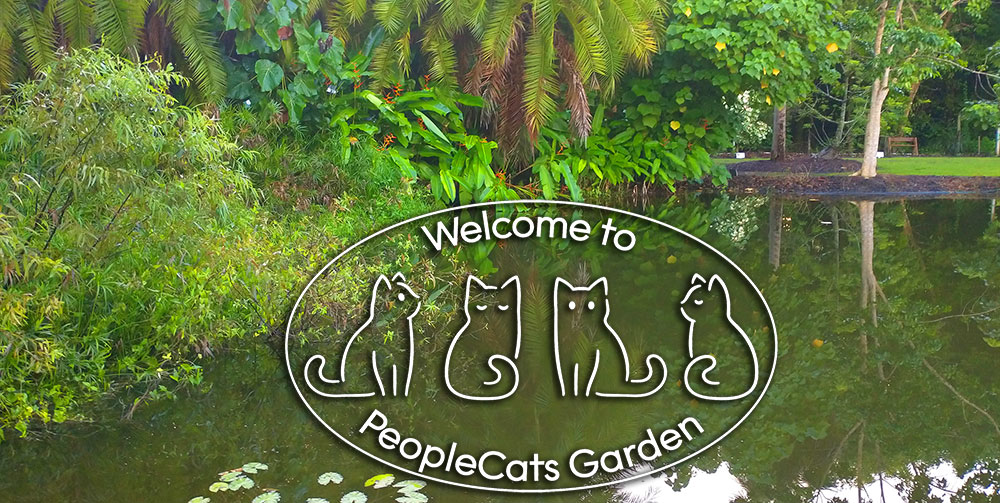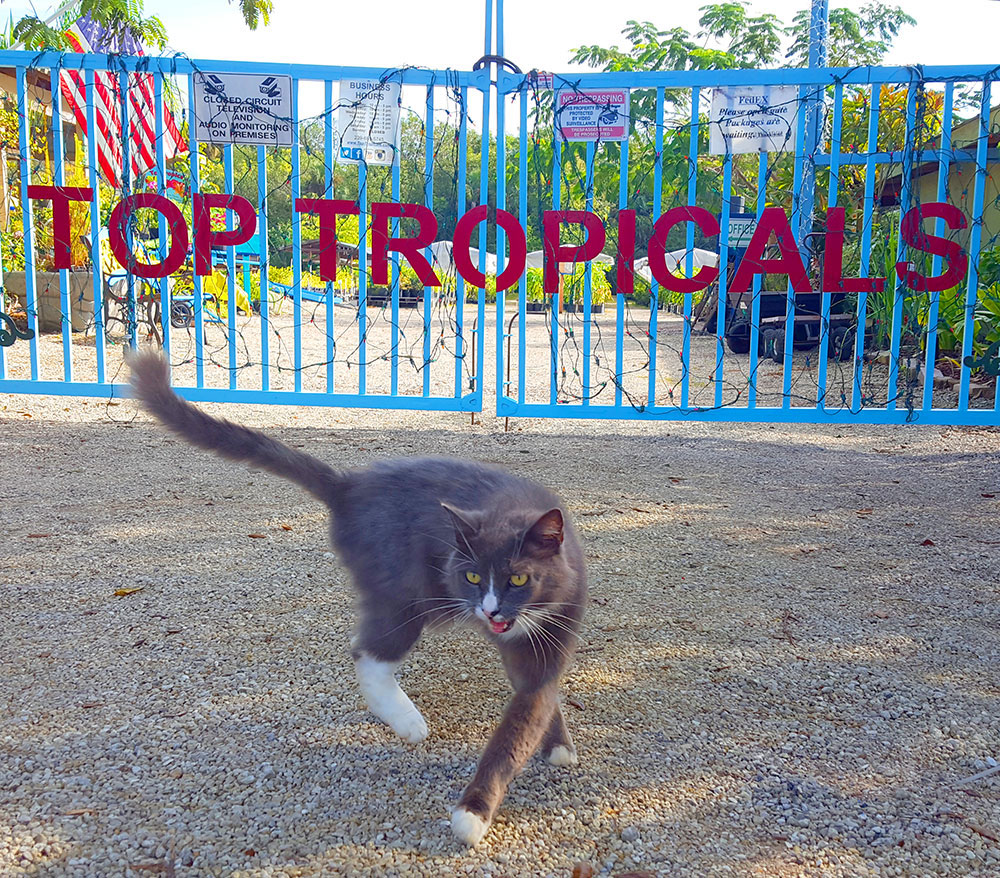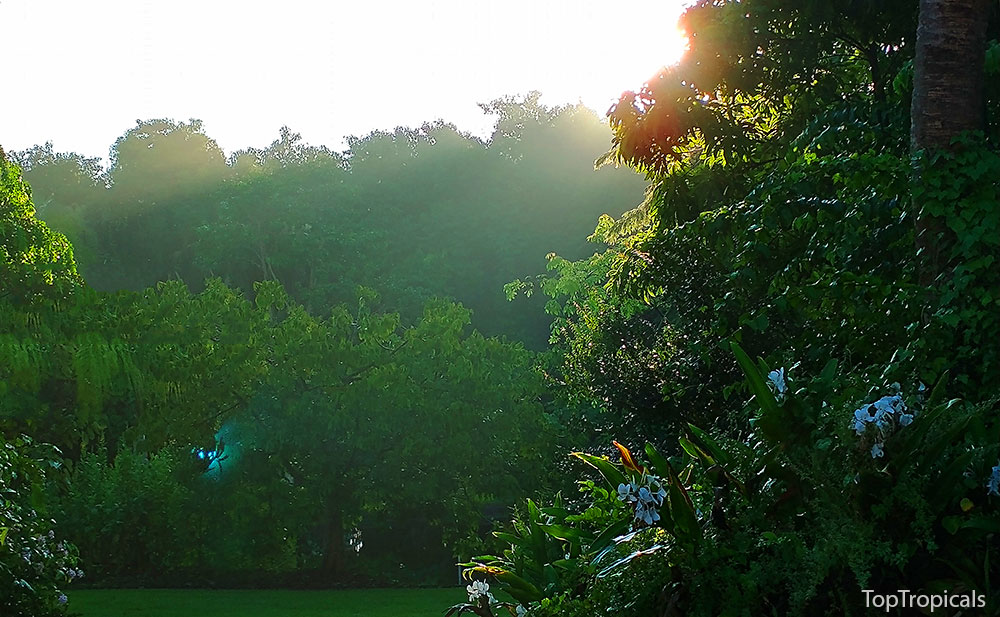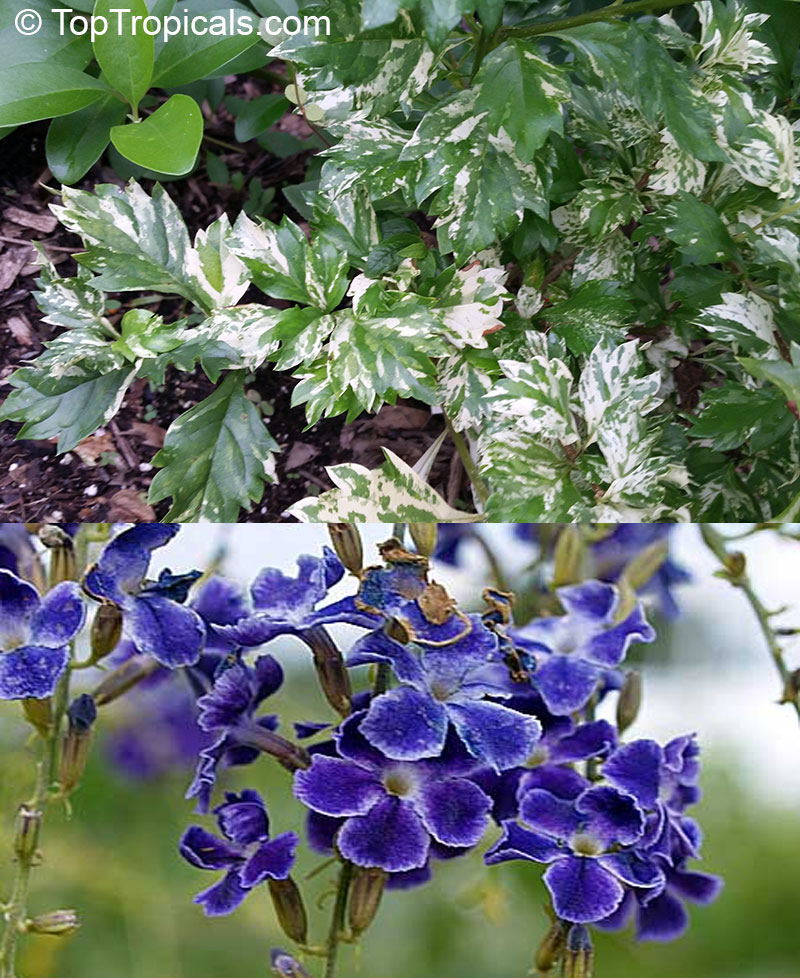Garden Blog - Top Tropicals
Date:
Cats in the
Garden.
Cat Breed: The Norwegian Forest Cat - Skogkatt
By Alex Butova, the Witch of Herbs and Cats
Meet the cats around us - they're our friends, protectors, and magical
mascots. They keep us healthy and can even save us in emergencies...
Winter brings a special time called the Solstice. It's when the earth
pauses its yearly cycle and starts a new one. This magical moment marks the
beginning of something enchanting...
Let's begin with the Norwegian Forest Cat. It's a mysterious and northern
feline friend, also called Skogkatt. It's like the wildcats in Scandinavian
fairy tales...
Skogkatt's favorite flower
What's Skogkatt's favorite flower in their homeland? Viking Poms, small yellow daisies. But in more southern regions, Daisy Trees - Montanoa - serve as substitutes, reminding them of their distant Northern homeland.
Montanoa atriplicifolia - Tree Chrysanthemum, Tree Daisy - one of the most impressive winter bloomers.
Date:
Privacy Hedges with Benefits
What's the numero uno question we get bombarded with at Top Tropicals Nursery? Well, it's a real head-scratcher:
Q: "...Can you recommend me a flowering privacy hedge to spice up my yard's life? My current hedge is just a green wall and I'm tired of the monthly trim routine. I need something lively, fast-growing, and unusual if possible. No plain old ixora, please!.."
A: After over two decades of being the go-to advice-givers, we thought, "Why not spill the floral beans and share our tropical wisdom?" But where to begin? The jungle of flowering ornamentals is vast, and picking the perfect shrub is like finding the missing piece of a gardening puzzle. So, in our new column "Hedges with Benefits" we're dishing on those not-so-average shrubs that'll not only prettify your patch but also bring some serious practicality. Today's lineup is -
Top Ten Winners:
Fast growing flowering shrubs
Below is the top selection of spectacular flowering shrubs that can create a nice hedge or a natural screen within just a couple of seasons.
Tithonia diversifolia - Sunflower tree.
Grows super fast to a very tall dense hedge, and starts flowering right away. Full sun, very easy, not
fussy about soil or water. Winter bloomer.
Calliandra surinamensis - Powderpuff.
Pretty pink powderpuffs almost year around! Easy to prune.
Dombeya x wallichii - Tropical Hydrangea.
You can see this beautiful bush right at Top Tropicals gate. Winter bloomer, large lush leaves and huge, pink hydrangea-like blooms. Very large and fast growing, likes water, tolerates shade.
Acalypha hispida - Cat tail, Chenille plant.
All time favorite, everblooming with red cat tails! Full sun. Easy to control.
Hibiscus variegated Snow Queen.
Popular landscape bush with unusual look, red flowers over snow white variegation, very showy! Responds well to
pruning. Full sun.
Leonotis leonurus - Lions Ears.
Winter bloomer, great for low hedges. Covered with bright orange curious flowers,
medium sized, easy to control at 3-4 ft. Full sun.
Plumbago auriculata Imperial Blue
One of the most popular Southern hedge plants, everblooming with bright blue flowers, tolerant to drought, heat, and poor soils. Can be maintained short or tall (2-6 ft).
Eranthemum pulchellum - Blue Sage, Lead Flower.
Great for shady spots, winter bloomer with dark green leaves and unusual sky-blue flowers. Can be trimmed if needed. Nice and dense.
Clerodendrum paniculatum - Pagoda Flower. Happy in the sun or shade, easy plant. Loves water.
Tibouchina lepidota - Ecuador Princess, Jules Dwarf.
Sun or shade, blooms on and off throughout the year. Beautiful Purple
Princess!
Date:
Hedges
with Benefits
Reference Chart
Large and fast growing
Tithonia diversifolia - Sunflower tree
Acacia farnesiana
- Sweet Mimosa
Calliandra
surinamensis - Powderpuff
Aloysia virgata
- Almond Bush
Dombeya x wallichii - Tropical Hydrangea
Cornutia grandifolia - African lilac
Gmelina
philippensis - Parrots Beak
Hibiscus
mutabilis Cotton Candy - Mallow Hibiscus
Senna alata -
Empress Candle, Candelabra Plant
Medium or easy-trim
Acalypha hispida - Cat tail, Chenille plant
Bauhinia galpinii - Pride of De Kaap
Cestrum nocturnum
- Night blooming jasmine
Dombeya seminole
- Tropical Rose Hydrangea
Gardenia thunbergia - Forest
gardenia
Hamelia patens - Fire Bush
Hibiscus variegated
Snow Queen
Jasminum sambac
Maid of Orleans
Ochna integerrima
- Vietnamese Mickey Mouse, Hoa Mai
Odontonema callistachyum - Lavender Butterfly Bush
Odontonema cuspidatum - Firespike, Red
Rondeletia
leucophylla - Panama Rose
Tecoma stans - Yellow Elder
Short or slow growing
Aglaia odorata - Chinese Perfume Plant
Allamanda
schottii - Dwarf Allamanda Bush
Brunfelsia pauciflora Compacta - Dwarf Yesterday-Today-Tomorrow
Clerodendrum
incisum - Musical Note
Calliandra schultzii -
Dwarf calliandra
Gardenia
vietnamensis - Vietnamese Gardenia
Leonotis leonurus
- Lions Ears
Neea psychotrioides - Pigeon Plum, Hoja de Salat
Plumbago auriculata Imperial Blue
Garden Specimens
Combretum constrictum Thailand, Ball of Fire
Caesalpinia
pulcherrima - Red Dwarf Poinciana, Bird of Paradise
Clerodendrum
quadriloculare - Winter Starburst
Euphorbia
leucocephala - Snows of Kilimanjaro, Pascuita
Gardenia nitida - Shooting Star Gardenia
Hibiscus schizopetalus - Coral Hibiscus
Jatropha integerrima compacta
Kopsia fruticosa - Pink Gardenia
Malvaviscus x penduliflorus
Variegata - Summer Snow
Mussaenda philippica
x flava - Calcutta Sunset (Marmelade)
Plumeria pudica - Bridal Bouquet
Semi-Shade to Shade
Clerodendrum bungei - Glory Bower
Clerodendrum
paniculatum - Pagoda Flower
Eranthemum pulchellum - Blue Sage, Lead Flower
Clerodendrum
speciosissimum - Java Glorybower Mary Jane
Justicia carnea
- Pink Brazilian Plume, Jacobinia
Magnolia figo -
Banana Magnolia
Megaskepasma erythrochlamys - Brazilian plume
Thunbergia erecta - Kings Mantle
Tibouchina lepidota - Ecuador Princess, Jules Dwarf
Edible Hedges
Eugenia uniflora - Black Surinam Cherry Lolita
Camellia sinensis
- Tea Leaf
Hibiscus
sabdariffa - Flor de Jamaica, Karkade Sorrel
Laurus nobilis - Bay Leaf
Manihot esculenta
- Yuca Root
Nashia inaguensis
- Moujean Tea, Bahamas Berry
Sauropus androgynus - Katuk, Tropical Asparagus
Sauropus Variegata - variegated Katuk
Date:
Easy compact bush for sandy soil
Caesalpinia pulcherrima - Red Dwarf Poinciana, Bird of Paradise.
Q: Can you recommend a flowering bush that will be in full sun and in sandy soil. I do not want it to exceed 10 feet.
A: For a garden specimen bush that is medium size and tolerates poor soils, we can recommend to choose from the plants below. These are all easy to grow, not fussy about soil and water, and stay compact and require minimal or no trimming at all.
Calliandra surinamensis - Powderpuff - 6-8 ft
Hibiscus
mutabilis Cotton Candy - Mallow Hibiscus - 5-6 ft
Dombeya seminole
- Tropical Rose Hydrangea 4-6 ft
Allamanda
schottii - Dwarf Allamanda Bush 3-4 ft
Brunfelsia
pauciflora Compacta - Dwarf Yesterday-Today-Tomorrow - 4-5 ft
Calliandra
schultzii - Dwarf calliandra - 4-5 ft
Plumbago
auriculata Imperial Blue
Caesalpinia
pulcherrima - Red Dwarf Poinciana, Bird of Paradise - 2-4 ft
Hibiscus
schizopetalus - Coral Hibiscus - 5-6 ft
Jatropha
integerrima compacta - 4-5 ft
Clerodendrum
bungei - Glory Bower - tolerates shade, 4-5 ft
Eranthemum
pulchellum - Blue Sage, Lead Flower (prefers shade) - 4-5 ft
Magnolia figo -
Banana Magnolia - small tree, 6-8 ft
Megaskepasma
erythrochlamys - Brazilian plume (tolerates shade) - 5-6 ft
Tibouchina
lepidota - Ecuador Princess, Jules Dwarf - 3-4 ft
Leonotis leonurus
- Lions Ears - 3-4 ft
Also, for your further reference, check out the reference chart Hedges with Benefits Chart to see different flowering bushes that are great for hedges as well as garden specimens, depending on your specific needs.
Megaskepasma erythrochlamys - Brazilian plume.
Brunfelsia pauciflora Compacta - Dwarf Yesterday-Today-Tomorrow.
Leonotis leonurus - Lions Ears.
Date:
Butterfly Bush: Fast, Pretty, Low Maintenance...
Five unbeatable reasons to plant Butterfly Cassia
Q: I am trying to find some easy flowering shrub to screen the ugly corner of my neighbor's yard, can you suggest something fast growing and pretty?
A: One of our favorite flowering shrubs in Florida is the Cassia bicapsularis, commonly known as Scrambled Egg Bush or Butterfly Bush. It is one of the most desirable plants for the southern landscape. It has all the benefits any gardener may dream of, whether a beginner or an expert:
1. Very fast growing, can screen unwanted views and create a beautiful flowering hedge. Cassia bicapsularis is known for its rapid growth, making it an excellent choice for quickly transforming an unsightly corner into a vibrant and lush area. Its dense foliage and attractive yellow blooms add both beauty and privacy to your outdoor space.
2. Easy to grow, not fussy about soil or water, drought and flood tolerant, cold tolerant. Butterfly Bush is incredibly adaptable and resilient. It thrives in a variety of soil types, is not demanding when it comes to water, and can withstand both drought and occasional flooding. Additionally, it is cold tolerant and can withstand occasional frosts once established.
3. Blooms for many months, featuring especially in winter flowers from Fall to spring. Very pretty, large "sunny" flowers resembling bright yellow butterflies, hence the name. It is a generous bloomer, gracing your garden with vibrant yellow flowers for an extended period, particularly from fall to spring. The large, sunny blooms not only add visual appeal but also attract pollinators, enhancing the ecological balance of your garden.
4. Attracts lots of butterflies. As the common name suggests, the Butterfly Bush is a magnet for butterflies. If you enjoy the presence of these beautiful winged creatures in your garden, planting Cassia bicapsularis is an excellent way to encourage and support butterfly populations.
5. Low maintenance. Butterfly Bush can be trimmed and controlled at the desired shape if needed, but if you have room for a big bush in a full sun area - just let it go and it will form a nice dense bush without any pruning: this shrub is a low-maintenance delight. While it can be pruned and shaped according to your preferences, it also flourishes when left to grow naturally. Its ability to form a dense and attractive bush without constant pruning makes it an ideal choice for those seeking a fuss-free gardening experience.
If you're looking for a fast-growing, low-maintenance, and aesthetically pleasing solution to screen an unsightly corner, Cassia bicapsularis is an unbeatable choice. It ticks all the boxes for a beautiful and resilient flowering shrub in the southern landscape.
"...Without a doubt, Butterfly Cassia became one of my favorite plants during my visit to Florida for Christmas a few years ago. I only wish I could have taken it back home with me to Latvia. If only my windowsill hadn't already reached its greenhouse capacity!.." - Alex Butova.
To see more options for flowering shrubs, check out the reference chart Hedges with Benefits Chart.
Date:
Benefits of growing your own tropical fruit
"The fruit of the mango tree is no longer forbidden.
Indeed, it has been recommended to me by the physicians as an antidote to the
plague."
- Louis IX, King of France -
Q: Why do you want to grow your own tropical fruit tree?
A: Growing your own tropical fruit tree can have many benefits. Here are a few reasons why someone might choose to grow their own tropical fruit tree:
1. Fresh, flavorful fruit: When you grow your own tropical fruit tree, you have access to fresh, flavorful fruit that you may not be able to find at your local grocery store. Tropical fruit, like avocado, mangoes, papayas, and passionfruit, jackfruit, Dragon Fruit, Annona have a short shelf life, and the fruit you find at the store may have been harvested weeks ago. When you grow your own fruit tree, you can pick the fruit when it's fully ripe and enjoy it at its peak flavor. Besides, some rare fruit like Akee or Sapodilla simply never offered from the store.
2. Environmental benefits: Growing your own fruit trees can have environmental benefits. Trees absorb carbon dioxide from the air and release oxygen, which can help reduce your carbon footprint. Additionally, growing your own fruit trees reduces the need to transport fruit long distances, which can help reduce greenhouse gas emissions.
3. Cost savings: Depending on where you live and the availability of tropical fruit, growing your own fruit tree can be a cost-effective way to enjoy your favorite tropical fruits.
4. Gardening and outdoor hobby: Growing a fruit tree can be a fulfilling and rewarding outdoor hobby. It can also be a great way to teach children about where their food comes from and the importance of taking care of the environment.
Overall, growing your own tropical fruit tree can be a great way to enjoy fresh, flavorful fruit, reduce your carbon footprint, save money, and enjoy a fulfilling outdoor hobby.
In the photo: Mango tree in Top Tropicals garden.
Date:
Five benefits of growing your own Pineapple
Q: Can I grow my own pineapple fruit?
A: Growing a Pineapple plant - Ananas comosus - is a fun and rewarding experience that offers both visual and practical benefits:
1. Fresh, homegrown fruit: One of the main benefits of growing a pineapple plant is that you can enjoy the fruits of your labor by harvesting fresh, delicious pineapples right from your own backyard.
2. Aesthetic appeal: Pineapple plants are visually appealing with their long, spiky green leaves and bright, vibrant fruits. They can add a tropical, exotic touch to any garden or indoor space.
3. Low maintenance: Pineapple plants are relatively easy to grow and require minimal maintenance. They can tolerate a variety of soil and light conditions and don't require frequent watering or fertilization.
4. Health benefits: Pineapple fruit is rich in vitamins, minerals, and antioxidants that can provide a range of health benefits, including improved digestion, boosted immunity, and reduced inflammation. It is recommended to eat a slice of a pineapple after every meal to keep healthy digestive system.
5. Collectable varieties: The pineapple plant can be easily propagated by cutting off the top of a pineapple fruit. However, for those seeking excellent quality, it is recommended to choose superior hybrids from professional growers. Become the proud owner of "The King of Fruits" collection! It takes up minimal space and provides fresh fruit throughout the year.
Read more about Pineapple: The most luscious Hospitality Fruit - Pineapple.
Remember to add Sunshine Ananas fertilizer to your purchase for a long lasting Pineapple crop season.
Date:
Meet PeopleCats of TopTropicals. Cat of the Day: Sonya, the Co-Author
In our previous newsletter, you met our editor/photographer tandem - Tilda & Marina. Today we introduce our columnist assistant - Sonya. For the past decade, this True Norwegian Forest Cat has been a great helper and inspirational co-author for Alexandra, TopTropicals website writer and social media blogger.
Alex has been with TopTropicals since Day One (2003). In 2011, she got Sonya, a 3-month old kitten that someone kicked out: at that young age she already had quite a temper of a real Wild Cat. No one wanted to adopt her and Sonya was doomed to suffer a street life... So Alex invited her in the house... and it took her many months to teach Sonya some good manners! And Sonya turned into a beautiful and affectionate Purrrson as well as became the Boss in the house (what a surprise, duh) and Alexandra's dearest life companion. Sonya also discovered her talent in writing plant stories for TopTropicals, sitting on Alex's shoulder and whispering into her ear while she is typing Sonya's horticultural tips. And when Alex stares at monitors for more than 5 hours, Sonya lays on her keyboard saying: "Now get up and get some stretch lady! Let's go re-pot some plants for a change!"
We will be following up on Sonya's creative work, and you will hear from her again soon...
Check out and more Cat of the Day stories.
Date:
PeopleCats Botanical Garden Grand Opening
Guided tour with Mark Hooten
Top Tropicals Garden Center is pleased to invite you to visit our new PeopleCats Botanical Garden on the grounds of Top Tropicals in Ft
Myers. It is named in honor of the relationship with our beloved Cats, who we treat like People. You'll see our Garden PeopleCats roaming the property. As a matter of fact, they rule
the garden!
The Garden has many mature trees and plants so you can see what they look like before your purchase them in our Garden Center. And of course, our
PeopleCats will be guiding you in the Gardens!
Photo above: blue light in the forest - TopTropicals Garden Ghost, the spirit is always watching!
Date:
FEATURED BUTTERFLY PLANT:
Duranta variegata - Variegated Sky Flower
Variegated Sky Flower is grown for its summer flowers and ornamental fruit. This evergreen fast-growing shrub spreads and arches to 10 feet tall and wide and is great for live hedges and covering fences and corners. In the summer, cascading clusters of blue tubular flowers appear followed by wonderfully contrasting orange-yellow berries. This variegated form has creamy-yellow margins around the one inch long serrated leaves. In mild climates, this plant can be in flower nearly year round with flowers and fruit appearing at the same time. It does best in full sun with frequent deep watering and is hardy to about 20-25F. A good choice for espaliers, as a small tree or large bush; all forms benefit from frequent selective pruning. Flowers are very attractive to butterflies. Great for providing a color contrast in the landscape, and is especially well-suited as a bright-colored background or screening. Prune back in late winter to encourage a more compact shape and strong flush of fresh spring foliage. Requires moderate watering in a well-drained soil.
